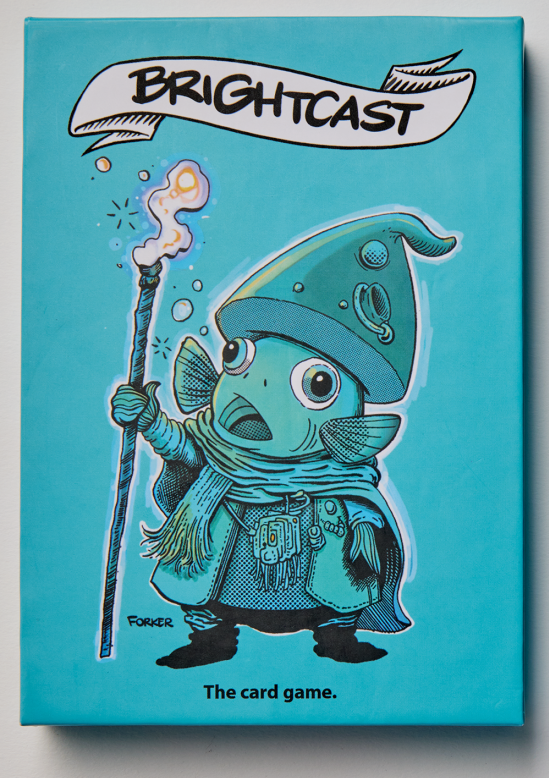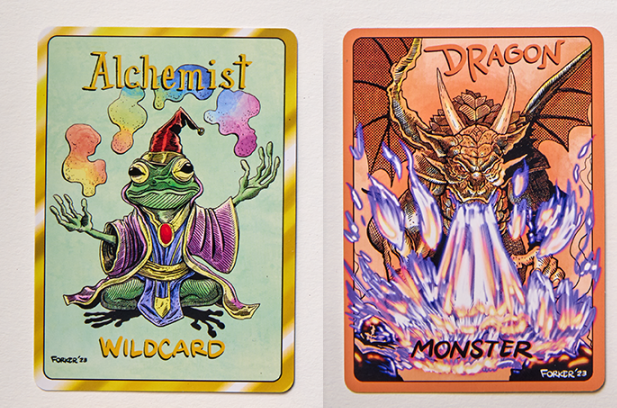I love Brightcast. It was my favorite new game from PAX Unplugged last year, and it’s easily my most played game from the show. I’ve brought it with me to pretty much every event I’ve gone to, from weekly Magic, to PAX East.
I’ve showed it off to the local LGS’s I go to, and convinced at least one of them to stock it. I’ve done everything in my power to show it to more people… except actually write a review.
So we’re gonna correct that now.

The Game
Brightcast is a 1v1 dueling game. There’s no asymmetry. Both you and your opponent are working with the same set of tools: six copies of each of Spellcasters, two copies of the dragon, and two copies of the Alchemist. You each get a single deck of 34 cards of 7 different types.

Let’s start with the Spellcasters, since they’re how you actually win. There are five spellcasters: the Sage, the Warlock, the Druid, the Sorcerer, and Wizard. In order to win, you need to collect either one of each, or five copies of a single one into your tableau.
How do you do this? Well, it’s quite simple. On your turn, draw a card, then pick a card from you hand to add to play. You get its effect, and if it’s a Spellcaster, you then add it to your tableau. (You can alternatively choose to draw a second card instead of playing a card, but you usually don’t want to.)
Let’s talk about their effects. The Sorcerer is the simplest, destroying a single card in your opponent’s tableau when played. The Warlock works a bit in reverse, returning a single card from your discard pile to your hand. The Sage draws you two more cards, then requires that you discard 1, while the Druid makes your opponent reveal their hand and discard a card of your choosing. And then there’s the Wizard.
The Wizard is a bit special. You can play the Wizard from your hand and just draw one card. Or—and this is what you’ll want to be doing most of the time— when your opponent plays a card, you can discard a Wizard and a copy of the card your opponent played to block their play. Sure, it’s a two-for-one, but it can be worth it to slow your opponent down.
Then there are the last two card types: The Dragon and Alchemist.

When you play the Dragon, you can destroy up to 3 cards from your opponent’s tableau. When you play the Alchemist, you can copy the effect of a Spellcaster you already have in play in your tableau. Both of these are obviously a fair bit more powerful then the other cards, and as such they don’t go into the Tableau, and they also can’t be recovered with the Warlock.
Why I love it
Okay, so that was a lot of rules text, but importantly, that’s also pretty much all of the rules. You could take everything I wrote up above, make your own copy of Brightcast, and play it reasonably accurately. It’s the sort of game you can teach to someone in five minutes, and play multiple games for the next 45.
Because despite that simplicity, Brightcast offers a lot of interesting choices. Do I play my dragon, knowing they might pull it out of my hand with a druid, or do I try to hold it for the perfect moment? Do I play Sage after Sage, trying to get all five out quickly? Should I daisy chain warlocks into having a bit of a buffer for completing a set of five, or just grab back a Druid to pull their Sorcerer out of their hand?
I could go on! I won’t. But I could!
Brightcast fits into a similar space as Tiger and Dragon for me. It’s not a full course meal on its own. But it’s the sort of thing that you can slip in a game of anywhere, or teach to a complete stranger. I’ve played a fair amount of it in between Magic games, or while while waiting for events to start.
There’s a fascinating set of decision points from an incredibly simple set of cards, and it’s fun enough to play over and over. Also, and I’ll say this again, the art is just incredible.
Overall
The back of Brightcast describes it as “Deceptively simple, secretly deep” and I can’t think of a better descriptor. It’s quick to learn, and offers a interesting play choices all throughout the game. If you like Magic: The Gathering, or clever dueling games, I highly suggest trying Brightcast.
Who knows. Maybe you’ll become as much of an evangelist for it as I have.
Quick Note: Brightcast is currently only available from direct retailers, so the best way to get a copy is to ask your LGS to stock it, or check if they already have it available. If you’re up in New Hampshire like me, The Fourth Place has some copies.
